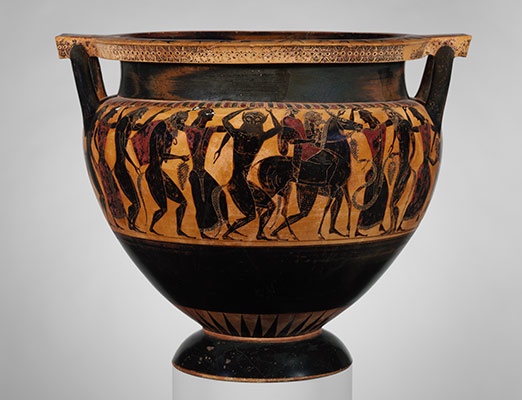Greek theatre Era
social -


- Girls had to do exactly as their father told them and this included marrying the man their father chose for them.Even when married, a women was not free. She had to do as her husband wished. She was not allowed out on her own and was not often seen by people other than her own family.
- Schools
Greek schools were small. They had only one teacher and about ten or twenty boys. The schools were not free and so only the rich could really afford to send their children to school.
The children did not need much school equipment as they had to learn everything off by heart. When they needed to, they wrote on wooden boards covered with layers of wax. They used a wooden pen called a stylus with a sharp end for writing and a flat end for 'rubbing out'. The wax was melted and reapplied from time to time.
- Boys and Girls
Education was also different for boys and girls. Boys were educated to become good citizens and take part in the public life of the city state. Girls were educated in housekeeping and how to look after the family.
- Most Greek children, especially the girls, never went to school. Greek girls were not allowed to go to school and were often educated at home.
- All the actors were men. They wore large masks that exaggerated facial features and emotions. The mouth hole was large to help amplify the voices. Greek plays were either comedies or tragedies. Tragedies were often about the past, whereas comedies tended to be about current and everyday life. Actors in comedies wore bright colours. Actors in tragedies wore dark colours.
historical -
- Boys and Girls
- Athens where the world's first democracy, Instead of being ruled by a king, Athenian citizens would meet to decide how the city should be run. However, not everyone got a say - women, slaves and foreigners were not allowed to vote.
- The Greeks enjoyed singing and dancing. At first, theatres were only used for festivals.
 The Spartans were very serious soldiers and they spent their entire lives training for battle.
Boys left their families when they were seven years old to begin their 23 years of training to become a soldier. Only those who made it through were considered true Spartan citizens.
Sparta was ruled by two kings,One king might stay at home, while the other goes away fighting battles. The most famous king of Sparta was Leonidas, He led 300 Spartans against the Persian army at the Battle of Thermopylae.
The Spartans were very serious soldiers and they spent their entire lives training for battle.
Boys left their families when they were seven years old to begin their 23 years of training to become a soldier. Only those who made it through were considered true Spartan citizens.
Sparta was ruled by two kings,One king might stay at home, while the other goes away fighting battles. The most famous king of Sparta was Leonidas, He led 300 Spartans against the Persian army at the Battle of Thermopylae.
The Spartans were very serious soldiers and they spent their entire lives training for battle.
Boys left their families when they were seven years old to begin their 23 years of training to become a soldier. Only those who made it through were considered true Spartan citizens.
Sparta was ruled by two kings,One king might stay at home, while the other goes away fighting battles. The most famous king of Sparta was Leonidas, He led 300 Spartans against the Persian army at the Battle of Thermopylae.
cultural background -

- Men had a much better life in Ancient Greece than women, only men could be full citizens , they were the only ones allowed to make important decisions. Normally, only men fought in armies, took part in sports and met in public.
- Spartan women were taught threading and writing and skills to protect themselves in battle.They had more freedom than women and girls living in Athens. As well as looking after the house, making clothes.
- Women in Athens were taught skills they would need to run a home such as cooking and weaving. They were expected to look after the home, make the clothes, and bear children.
- Only in the poorest homes were women expected to carry out all the duties by herself. Most homes had female slaves who cooked cleaned and collected fresh water every day.
- There were also male slaves. Their responsibilities included protecting the home and tutoring male children.
- The Greeks were famous for their clay pots. Potters in the city states of Corinth and Athens made beautiful pottery.
- The Greeks were really good at making statues too. Master sculptors carved lifelike marble statues and decorated them with brightly-coloured paints.

Comments
Post a Comment